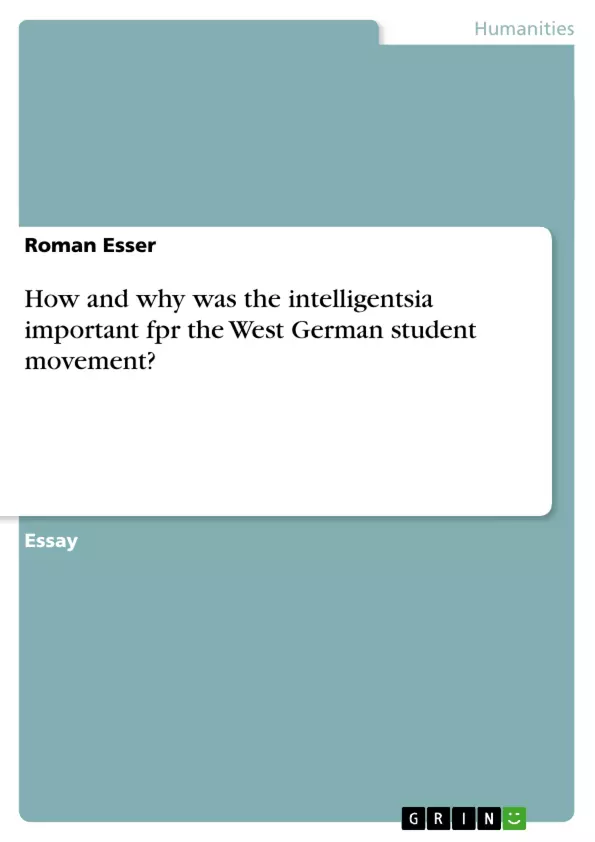The following essay is supposed to follow the question “How and why was the
intelligentsia important for the West German student movement”. It is primarily
essential to clarify two significant points in order to answer this question. Firstly, in
contrast to popular thought there was never such thing as one solid West German
student movement. There were always different –partly opposite- student groups.
The spectrum of the student movement embraced groups of various political
persuasions, “ranging from the [conservative, R.E.] Christian Democrats, to the
Liberal students, the more moderate socialist students (S.H.B.) and the radical
socialist federation of students (S.D.S.).”1
To simplify matters it is necessary to reduce the complexity of all these groups. The
SDS (Sozialistischer Deutscher Studentenbund) was undisputedly the most important
group of the student movement, having occupied the leading role in the student
protests. Besides, most discussions and intellectual approaches started within the
SDS or within its numerous organisations.2 Though, it offers to reduce the concept of
West German student movement to the SDS for reasons of practicability. [...]
1 Weller/Will v.d., 52
2 Langguth, 36
Inhaltsverzeichnis
- Introduction
- Why and How?
- Problems
- Conclusion
Zielsetzung und Themenschwerpunkte
This essay investigates the influence of the intelligentsia on the West German student movement. It explores the reasons behind this strong connection and the problems that arose as a result. The essay focuses on the role of the intelligentsia in shaping student thought, particularly within the context of the SDS (Sozialistischer Deutscher Studentenbund).
- The historical context of West Germany and the need to confront the Nazi past
- The influence of intellectual figures like Horkheimer, Adorno, and Marcuse on student ideology
- The role of the SDS and the New Left in seeking political and ideological alternatives
- The impact of the intellectual discourse on the West German student movement's connection to the general public
- The challenges of translating abstract theory into practical action
Zusammenfassung der Kapitel
Introduction
This section introduces the essay's central question: how and why was the intelligentsia important for the West German student movement. It acknowledges the diversity of student groups and the prominence of the SDS. It also highlights the mutually beneficial relationship between students and the intelligentsia.
Why and How?
This chapter explores various factors that contributed to the strong bond between the West German student movement and the intelligentsia. It discusses the inherent susceptibility of students to intellectual influences, Germany's historical baggage, and the political landscape of the 1960s. The chapter also examines the influence of intellectuals like Horkheimer, Adorno, Marcuse, and Mitscherlich on student thought.
Problems
This chapter focuses on the challenges associated with the strong connection between the West German student movement and the intelligentsia. It argues that the abstract and complex language of the student leaders alienated the working class, resulting in a lack of public support. The chapter also points to a disconnect between theory and practical action.
Schlüsselwörter
The key terms and concepts explored in this text include the West German student movement, the intelligentsia, the SDS, the New Left, historical context, political landscape, intellectual influence, abstract theory, practical action, and public support. The essay examines the relationship between these elements and their impact on student ideology and the broader society.
Frequently Asked Questions
What was the role of the SDS in the student movement?
The SDS (Sozialistischer Deutscher Studentenbund) was the most important group, leading protests and initiating intellectual discussions.
Which intellectuals influenced the West German student movement?
Figures like Horkheimer, Adorno, Marcuse, and Mitscherlich were central to shaping the movement's ideology.
Why did the movement face problems with the general public?
The abstract and complex language used by student leaders often alienated the working class and lacked public support.
How did the Nazi past affect the student movement?
The historical context of West Germany forced students to confront the Nazi past, which was a major catalyst for their political activism.
Was there only one West German student movement?
No, there were various groups ranging from conservative Christian Democrats to radical socialists like the SDS.
- Arbeit zitieren
- Roman Esser (Autor:in), 2004, How and why was the intelligentsia important fpr the West German student movement?, München, GRIN Verlag, https://www.hausarbeiten.de/document/21845


